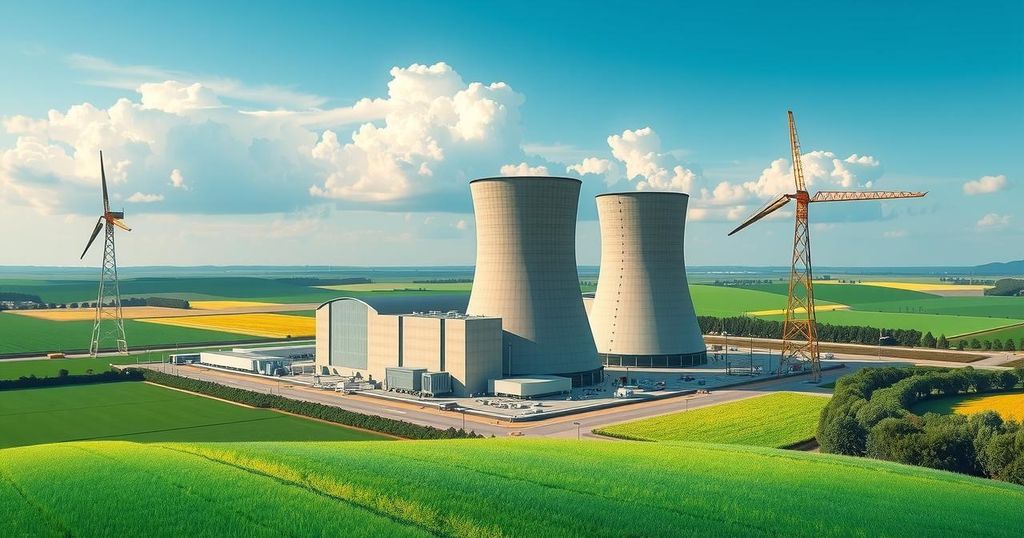Germany’s nuclear debate has reignited as the conservative CDU advocates for a return to atomic energy, prompted by soaring energy costs and reliance on Russian gas. The CDU and its allies are calling for research into small modular reactors (SMRs) as part of their election strategy. However, significant opposition remains due to safety and feasibility concerns, highlighting contradictions in Germany’s energy policy amid advancing global nuclear technology initiatives.
The nuclear energy debate has resurfaced in Germany just two years after the nation transitioned away from nuclear power following the Fukushima disaster in 2011. Energy costs have soared due to the country’s reliance on Russian gas, particularly highlighted during the ongoing crisis stemming from the conflict involving Ukraine. The conservative Christian Democrats (CDU) are advocating for a renewed exploration of nuclear energy as they prepare for the upcoming election on February 23, 2025.
CDU deputy parliamentary leader Jens Spahn emphasized the potential advantages of reintegrating nuclear power into Germany’s energy mix. He indicated the importance of developing small modular reactors (SMRs), arguing for their implementation as the demand for energy rises in an increasingly digital world. The CDU, along with its Bavarian sister party, the Christian Social Union, is making nuclear energy a central theme of their electoral strategy, supporting research into next-generation nuclear technologies.
Friedrich Merz, CDU leader and candidate for Chancellor, suggested potential collaboration with France in developing SMRs. The Free Democratic Party (FDP) also expressed willingness to support nuclear energy research, while the far-right Alternative for Germany (AfD) is pushing for a complete reversal of the nuclear phase-out, advocating for the reintroduction of large reactors. However, the movement towards nuclear faces significant resistance.
Germany’s nuclear safety agency has raised concerns over the untested nature of SMRs, citing uncertainty regarding their design, costs, and feasibility. Despite this, proponents like Rafael Laguna de la Vera from Sprind argue that Germany must re-engage with nuclear technology to avoid falling behind in the industrial evolution of energy, stressing the efficiency and safety of SMRs.
Lastly, the conflict between nuclear energy advocates and opponents highlights the contradictions within Germany’s energy policy. While the European Commission champions nuclear power as a vital component of the EU’s energy transition, nations such as the U.S. and China are significantly investing in SMR development. The call for Germany to reconsider its approach is underscored by the fact that renewable energy sources currently account for a significant portion of the country’s electricity, yet expert analysis suggests that these alone may not suffice to meet future energy demands sustainably.
In conclusion, the revival of the nuclear energy debate in Germany reflects current global and local energy challenges. With calls for innovation in nuclear technology growing amid high energy prices and geopolitical pressures, Germany’s energy strategy may be at a pivotal juncture as the electorate prepares to respond to these evolving scenarios.
Following the catastrophic events at Fukushima in 2011, Germany initiated a policy to phase out nuclear power, a decision that received broad public support. In recent years, however, the geopolitical landscape shifted dramatically after Russia’s invasion of Ukraine, leading to increased scrutiny of Germany’s energy policy, especially its dependence on imported fossil fuels. As energy prices surged, the debate about nuclear energy’s role in achieving energy security and climate goals has intensified, particularly as Germany aims to transition towards more sustainable energy sources.
The debate surrounding the revival of nuclear energy in Germany is emblematic of the challenges faced in balancing energy security, sustainability, and public safety. With rising energy costs and geopolitical instability prompting a reevaluation of energy sources, the position of nuclear power remains a contentious and pivotal topic. The future of Germany’s energy strategy will likely hinge upon innovative developments in nuclear technology and the political will to adapt to both domestic and international energy needs.
Original Source: www.politico.eu






